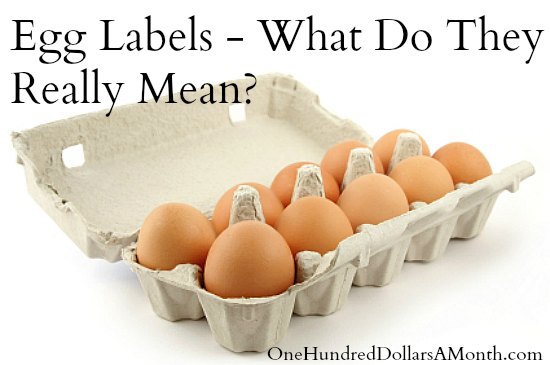
Have you seen the egg aisle of the grocery store lately? There are a lot of different choices for eggs.
And in case you have decided being a backyard chicken farmer just isn’t for you, here’s a quick overview of all of your egg choices–each of them appear to be clearly labeled on the egg cartons:
Omega 3 Enhanced Eggs: These come from chickens whose food has been enhanced with Omega 3 enriched supplements {think flax seeds, flax oil, walnuts, etc.}. The resulting eggs have a higher amount of Omega 3 fatty acids {you know, the ones they say we don’t get enough of}. They also have a higher amount of cholesterol, so if that is a concern for you, be aware.
Humanely Raised: These eggs are from hens that have been humanely raised, as opposed to conventional eggs where the hens are kept in tiny pens. The carton should have a certified human label. The chickens may or may not have access to the outdoors. There are some regulations on this label that limit the density of the birds in their barn/warehouse. They must also be allowed enough space to “perform natural behaviors”.
Organic: Organic eggs {certified organic, at least} come from chickens that have not been given antibiotics, hormones, and their food has not been exposed to pesticides. The thing to remember with these is that “organic” does not necessarily mean the chickens have a nice happy life–the chickens must be cafe free with some outdoor access, but federal regulations does not define that amount.
Conditions for the chickens can be awesome–or not. It just depends on the producer.
Free Range: Chickens are not in cages, and might roam freely for part of the day, but there are no regulations whatsoever on this label, so it is hard to say whether you are flushing extra money down the toilet. Also, there are no restrictions on the birds’ diets.
Cage free: This one is similar to free range, but chickens do not have to have access to the outdoors. Conditions can be a bit abysmal for the chickens and still get this label.
Animal Welfare Approved: This label is much harder to find. It is for independent family farmers with up to 500 chickens. The chickens are free to spend unlimited time outside on pesticide-free pasture. The chickens cannot have their beaks cut {ALL of the previous labels can and typically do cut the chickens beaks}. The best place to find these is to contact your local farmer’s market and/or go out to the farm to check out the conditions.
Source: onehundreddollarsamonth.com
No comments:
Post a Comment